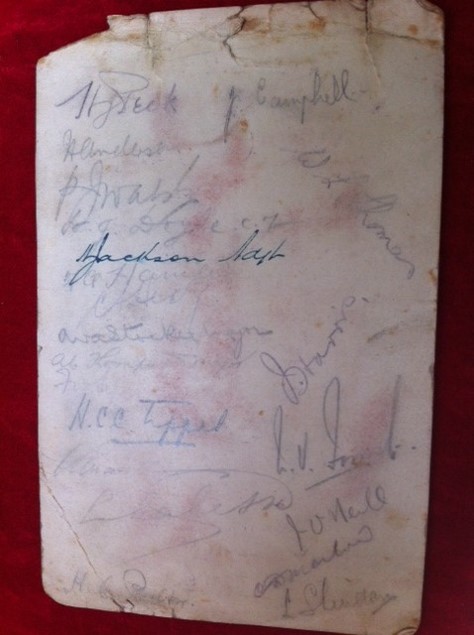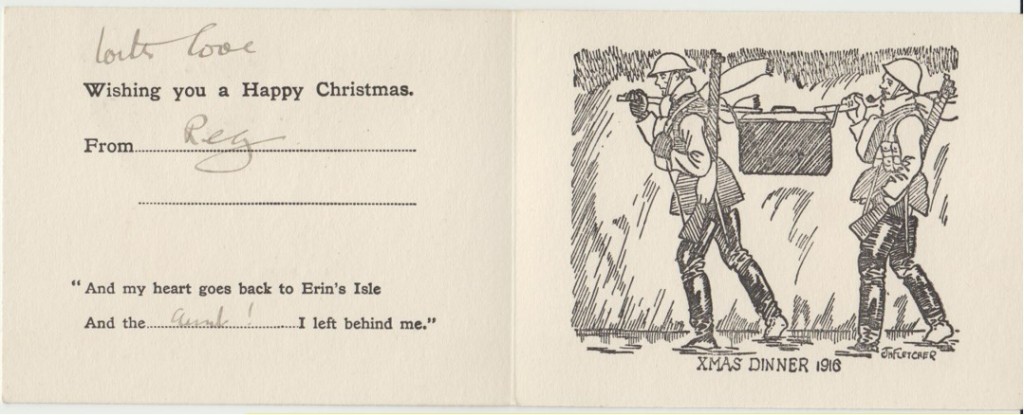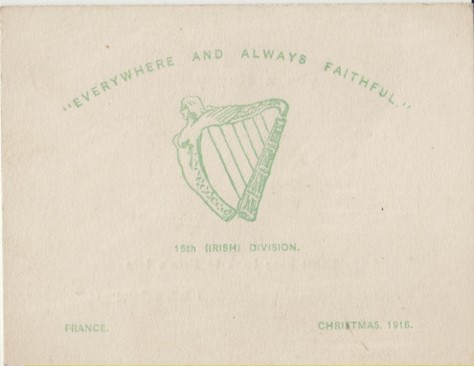Every Christmas it’s the same; historians of the Great War have their annual battle against proponents of duff history relating to the 1914 Christmas truce. It particularly irks me that the myth of a football match is perpetuated, and that there are entirely inappropriate monuments to it in Flanders, because it detracts from the wealth of evidence that football formed an important part of rest and recreation activities for troops behind the lines for a good part of the war. As a football fan it vexes me to think of the (actual and metaphorical) raised eyebrows when football is mentioned in connection with the Great War, such is the power of duff history to aggravate historians. (Photo of a Great War football for illustration purposes only – see credit at end.)

Of course, it could be a sweeping statement on my part that there is a wealth of evidence, so maybe I should qualify that by saying that there is such evidence from the sources relating to 16th (Irish) Division that I have consulted for the last decade and more. I have read references to football matches and competitions (not just kick arounds) in primary sources (battalion war diaries and letters) and secondary sources (unit histories and memoirs) together with other recreational activities such as rugby, cross-country running, boxing and shooting competitions.
For example, continuing the Christmas theme, despite the winter of 1916/17 being cold in the extreme, a chaplain of 48th Infantry Brigade records, in a letter home, a football match at Locre on St. Stephen’s Day (Boxing Day) where his battalions were behind the lines. The men had been relieved from frontline trenches in the Vierstraat sector (Ypres Salient) on 22nd December and went into Divisional reserve at Locre. Six days later they would be back in the freezing front line trenches, but there was no question for some of them (or maybe their commanding officers) that they should be kept tucked up inside.
The pull of familiar rituals of home also manifested themselves in other ways for the Roman Catholics of 8th Royal Dublin Fusiliers during that Christmas. The same padre, Fr Willie Doyle, describes:
“I got permission from General Hickie to have Midnight Mass for my men in the convent, a privilege which they showed their appreciation of by turning out in a way I never expected. The chapel is a fine large one; in ordinary times there are over 300 boarders and orphans in the convent. At the end of the chapel is the refectory separated by folding doors, so that by opening these we had double the space. An hour before Mass every inch of space was filled, even inside the altar rails and in the corridor, while numbers had to remain outside in the open, for word had gone round about our Mass and men from other battalions came to join us, some walking several miles from another village …

It was a Midnight Mass none of us will ever forget and will certainly live in our memories for many a year … A good 500 men came to Holy Communion, so that I was more than rewarded for my work …We were fortunate too in the weather, which had been very bad for months; however at Xmas it was beautifully fine and frosty, and Christmas a good day also, which helped to make things more pleasant… It was a strange Xmas. Masses in the morning, a good dinner for the men in the afternoon, which they thoroughly enjoyed ….”
Although the battalion war diary does not confirm either the football match or the Midnight Mass, it does confirm the Christmas dinner for the men:-
“Xmas day. The men were given a holiday today and their Xmas dinner was eaten in a large marquee put up in the convent grounds. The dinner went off very well and the men seemed to enjoy the day very much. Major General W.B. Hickie and Brigadier General F.W. Ramsay visited the men at dinner.”
The NCOs had a separate dinner and the officers of the battalion also dined together in the dining room of Locre Convent on St Stephen’s Day. Twenty-one of the officers present signed their names on the reverse of the menu card, including second-in-command of the battalion, Major A.C. Thompson, his brother, Captain F.S. Thompson, MC and the padre, Fr Willie Doyle, SJ, MC.


Whether the following incident occurred pre or post dinner Fr Doyle does not say:-
“Dec: 26th. The only thing of interest to chronicle today is a gallant but unsuccessful attempt to get a couple of months’ vacation by means of a ‘Blighty.’ I was riding on my bicycle past a waggon when the machine slipped, throwing me between the front and back wheels of the limber. Fortunately the horses were going very slowly and I was able, how I cannot tell, to roll out before the wheel went over my legs. I have no luck, you see, else I should be home now with a couple of broken legs, not to speak of a crushed head. The only commiseration I received was the remark of some passing officers that ‘the Christmas champagne must have been very strong.’”
He also wrote:-
“Up at the Front Line all was quiet. The Germans hung white flags all along their barbed wire and did not fire a shot all day, neither did we, so there was a slight attempt at least at ‘peace on earth to all men.”
One of 48th Infantry Brigade’s fellow brigades, 49th, had its 7th Battalion Royal Inniskilling Fusiliers in the front line on Christmas Day. Its history records:-
“At the time we all cursed heartily that it should be our bad luck to be holding the front line on Christmas Day … during the morning the Divisional Commander paid a visit to the battalion, and wished everyone the compliments of the season. The G.O.C. sympathised with our lot, but wished us the very best of luck in the New Year. Certainly, the General looked after his ‘boys’ wherever they were, and had the knack of cheering everyone with whom he came into contact. We learnt afterwards that he visited every unit in the Division that day … Practically, no hostile action took place all day – in fact, it was so quiet as to be uncanny. About dusk the Divisional Artillery fired a few salvoes over, but the enemy did not reply. The remainder of the evening was very quiet. It was not for two days that either side began to liven up, and then the overture came from our side.”
Confirmation, as explained in The Remarkable Story of the Christmas Truce (see link) that low scale Christmas truces did take place after 1914, but nothing like those that took place the first Christmas of the war. However the only organised football matches, as opposed to kick-abouts, that the fighting men of the Great War ever participated in were ones between their comrades.
Finally, I don’t know who Reg was (see below), but if he was in a unit of 16th (Irish) Division that was behind the lines on Christmas Day 1916 he struck lucky; equally if was in a unit that was in the front line it seems things weren’t too onerous anyway and he had a break at New Year to look forward to, if the account of the 7th Inniskillings is anything to go by:-
“A few days later we were relieved on the 30th inst., and went back to the ‘Shelters’ where it was decided to make up for the loss of Christmas by giving the men a really good feed. On the 31stDecember the officers held a dinner in Kemmel chateau.”


Sources/credits:-
My photo of the football held in Queen’s Museum Dover Castle belonging to 8th Battalion East Surrey Regiment, B Company, 6th Platoon (nothing to do with this blog, maybe a blog for another time), but it is a (famous) football from the Western Front.
Quotations from letters written by Fr Willie Doyle, SJ, MC, held in the family archive.
Photo of Locre Convent by Fr Frank Browne, SJ, MC & Bar, which had previously been in general circulation, taken from Father Browne’s First World War, E.E. O’Donnell, SJ, Messenger Publications, 2014.
My photos of the 8th Royal Dublin Fusiliers’ officers’ 1916 Christmas menu card held in the aforementioned family archive.
The Book of the Seventh Service Battalion The Royal Inniskilling Fusiliers, by G.A. Cooper Walker, Brindley & Son, Dublin, 1920.
My photos of inside and outer cover of a 16th (Irish) Division 1916 Christmas card.
History Hit documentary on YouTube via the link with my historian friends Taff Gillingham and Peter Hart addressing the duff history of the 1914 Christmas Truce.
So what is the duff history then Carol, is it the idea of an organized game at Christmas 1914? Rather than informal kickabouts?
LikeLiked by 1 person
Yes. I am not an expert and I leave it to those who have studied the evidence, but that is my interpretation of what I have read. Perhaps watch the HistoryHit film on YouTube for the historians’ point of view.
LikeLike
Great stuff again 👍🏻
LikeLiked by 1 person
Thank you Warren.
LikeLike
Thank you, Warren.
LikeLike